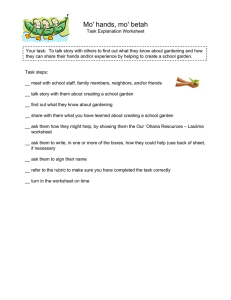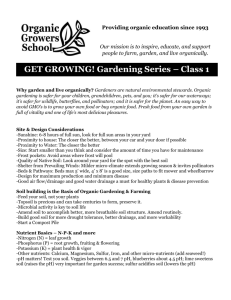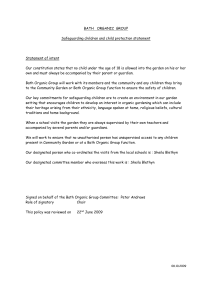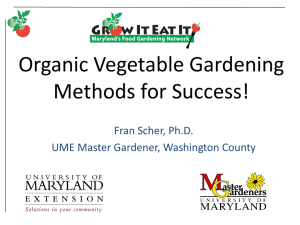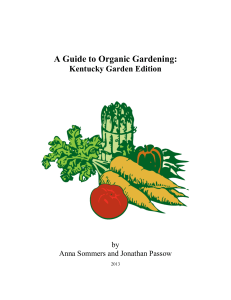April 2010 by Paul J. Pugliese “Organic Gardening 101”
advertisement
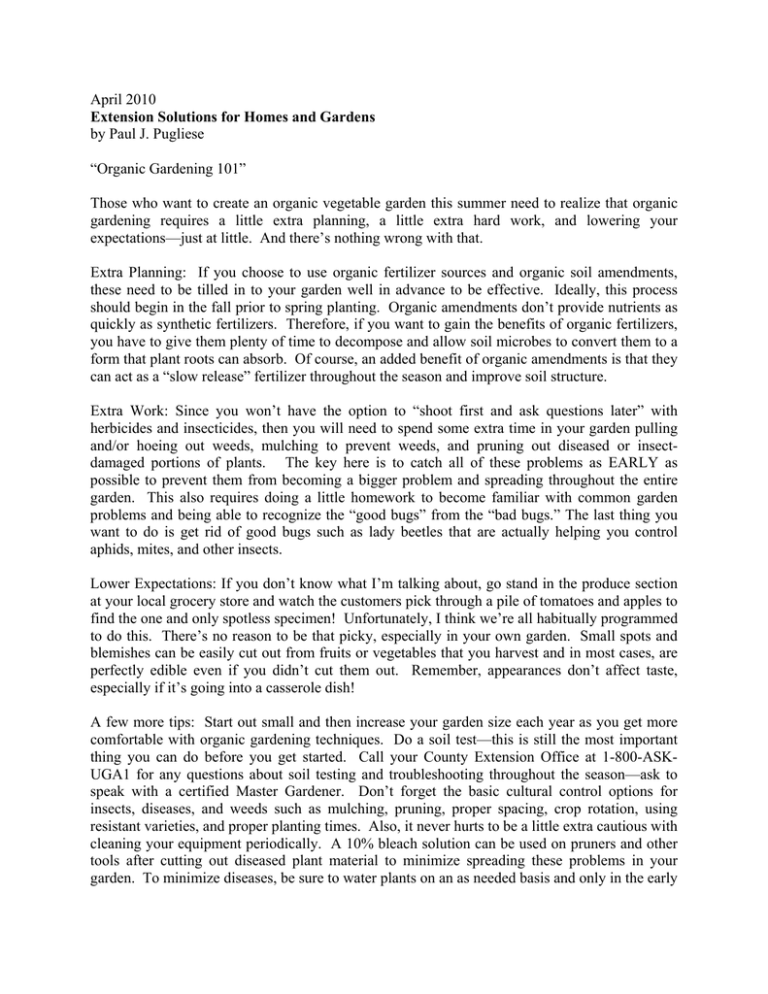
April 2010 Extension Solutions for Homes and Gardens by Paul J. Pugliese “Organic Gardening 101” Those who want to create an organic vegetable garden this summer need to realize that organic gardening requires a little extra planning, a little extra hard work, and lowering your expectations—just at little. And there’s nothing wrong with that. Extra Planning: If you choose to use organic fertilizer sources and organic soil amendments, these need to be tilled in to your garden well in advance to be effective. Ideally, this process should begin in the fall prior to spring planting. Organic amendments don’t provide nutrients as quickly as synthetic fertilizers. Therefore, if you want to gain the benefits of organic fertilizers, you have to give them plenty of time to decompose and allow soil microbes to convert them to a form that plant roots can absorb. Of course, an added benefit of organic amendments is that they can act as a “slow release” fertilizer throughout the season and improve soil structure. Extra Work: Since you won’t have the option to “shoot first and ask questions later” with herbicides and insecticides, then you will need to spend some extra time in your garden pulling and/or hoeing out weeds, mulching to prevent weeds, and pruning out diseased or insectdamaged portions of plants. The key here is to catch all of these problems as EARLY as possible to prevent them from becoming a bigger problem and spreading throughout the entire garden. This also requires doing a little homework to become familiar with common garden problems and being able to recognize the “good bugs” from the “bad bugs.” The last thing you want to do is get rid of good bugs such as lady beetles that are actually helping you control aphids, mites, and other insects. Lower Expectations: If you don’t know what I’m talking about, go stand in the produce section at your local grocery store and watch the customers pick through a pile of tomatoes and apples to find the one and only spotless specimen! Unfortunately, I think we’re all habitually programmed to do this. There’s no reason to be that picky, especially in your own garden. Small spots and blemishes can be easily cut out from fruits or vegetables that you harvest and in most cases, are perfectly edible even if you didn’t cut them out. Remember, appearances don’t affect taste, especially if it’s going into a casserole dish! A few more tips: Start out small and then increase your garden size each year as you get more comfortable with organic gardening techniques. Do a soil test—this is still the most important thing you can do before you get started. Call your County Extension Office at 1-800-ASKUGA1 for any questions about soil testing and troubleshooting throughout the season—ask to speak with a certified Master Gardener. Don’t forget the basic cultural control options for insects, diseases, and weeds such as mulching, pruning, proper spacing, crop rotation, using resistant varieties, and proper planting times. Also, it never hurts to be a little extra cautious with cleaning your equipment periodically. A 10% bleach solution can be used on pruners and other tools after cutting out diseased plant material to minimize spreading these problems in your garden. To minimize diseases, be sure to water plants on an as needed basis and only in the early morning. For more information, see publication B1011 on “Growing Vegetables Organically” and other gardening factsheets at our website www.ugaextension.com Paul Pugliese is the Agriculture & Natural Resources Extension Agent for Cherokee County Cooperative Extension, a partnership of The University of Georgia, The U.S. Department of Agriculture, and Cherokee County. (770) 479-0418. For more information and free publications, visit our local website at www.ugaextension.com/cherokee ###




